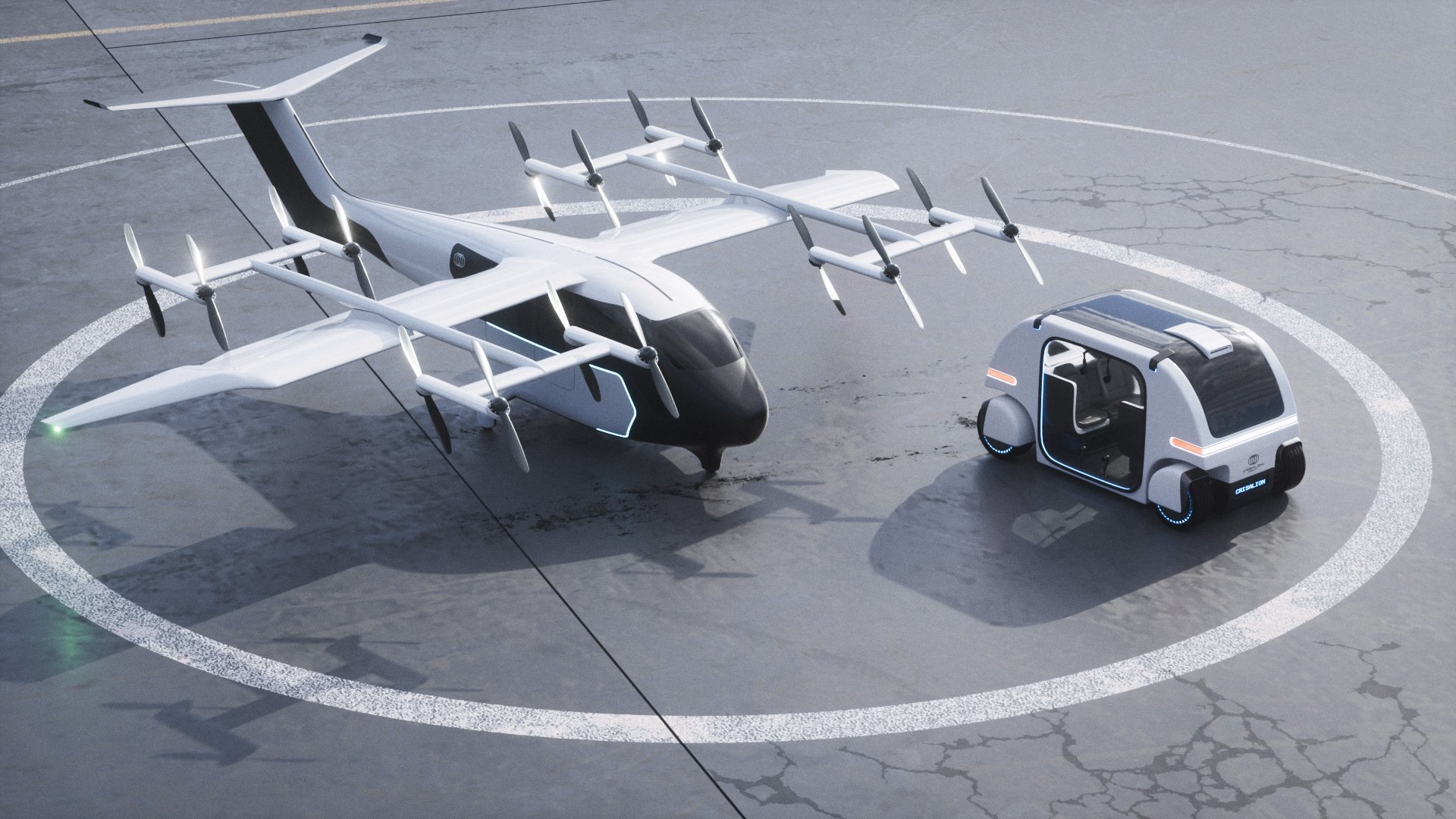Crisalion Mobility is targeting what seems likely to be a second wave of eVTOL aircraft market entrants at the end of the decade with the five-passenger Integrity model it unveiled in November. The Spanish start-up, which is set to launch a Series B funding round in the first quarter of 2024, believes its patented FlyFree propulsion and stability system will set it apart from the crowded field of lift-and-cruise and multicopter vehicles already vying to enter service from 2025.
Four sets of four-rotor units are attached to a pair of booms on a fixed wing, with each operating independently to give what the company says will be a higher degree of control and reliability. The piloted battery-electric aircraft is expected to have a range of 100 kilometers (63 miles), a cruise speed of 180 kph (110 mph), and noise levels of 45 decibels.
“Imagine suspending the aircraft from four drones that act as the propulsion system,” Crisalion’s managing director Manuel Heredia told AIN. “These are connected via passive joints with the individual rotors operating with their own power units. It is like a multicopter but can be controlled very precisely, with quick changes in direction, which makes for a smoother ride when it comes to absorbing wind gusts or turbulence. The transition will be very natural because everything is part of the same mechanism, and it’s achieved using differential power with no separate actuators.”
Heredia joined Crisalion in June, after serving in several senior leadership roles with Airbus Defence & Space, including programs such as the A400M military transporter and the Eurofighter. He admitted to having been skeptical about eVTOL aircraft and having to be convinced that the new company was taking a different approach.
The company was recently rebranded as Crisalion, having launched under the name UMiles Next in 2018. The FlyFree technology, using control software to “translate” pilot inputs to each of the controls for the 16 rotors, has been developed in partnership with a company called Technalia.
In 2022 the partners flew a technology demonstrator they had in mind as the basis for an autonomous eVTOL vehicle. At that point, they decided to change the architecture of the design and focus on developing a piloted aircraft with a wing to support longer-range flights.
In July, Crisalion applied to EASA for the design organization approval it needs for the type certification application it has now initiated for the Integrity aircraft. The company is aiming to be ready for entry into service in 2030, with applications such as cargo, middle-mile logistics, and emergency medical support viewed as being at least as viable as passenger-carrying services. “A lot needs to be done to educate the public [about eVTOLs] because this cannot just be a taxi service for wealthy people,” Heredia commented.
Being First to Market Isn't Everything
According to the former Airbus executive, being first to market isn’t necessarily the advantage it might seem in a new sector that has faced uncertainty over its regulatory foundations. “Some of the [eVTOL] pioneers have been working blind because the regulations have not been clear, and there have had to be some changes in direction. But in Europe, the framework is now quite stable,” he commented. “We have been encouraged by our discussions with the regulator, and they said it was refreshing to speak with us after so many idealistic conversations.”
To date, Crisalion has raised around €15 million ($16.3 million) with support from private investors, and it is now working with investment bank BlueBull to expand its capital base. Crisalion’s participation in the Dubai Airshow in November revealed significant interest from prospective Middle East backers and partners, and it has also been in contact with various parties in Latin America.
To accelerate work on the Integrity, the company is now looking to triple the size of its team to around 50 people. As it makes plans to establish a final assembly line, it is also sizing up prospective partners to provide some elements such as the electric powertrain and batteries. Heredia pointed out that Spain has a strong aerospace heritage while adding that the country’s government has shown interest in providing some support for new aerospace technology. Other local companies include composites specialist Aciturri which is helping Lilium build its six-passenger Lilium Jet.
As part of its preparations to enter the advanced air mobility market, Crisalion has signed a cooperation agreement with insurance group Skyrisks. The companies will work together to establish how suitable cover could be arranged for eVTOL operations and to explore the risk factors that will need to be considered.
